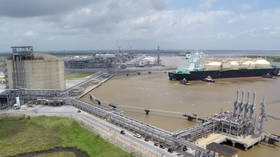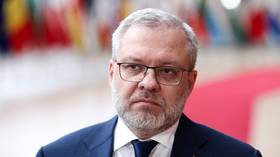EU boosts gas purchases from Russia – Reuters

The EU increased natural gas purchases from Russia in 2023, despite pledging to phase out all Russian fuel imports by 2027, Reuters reported on Wednesday, citing calculations based on the bloc’s trade statistics.
According to news agency, the substantial rise in imports came as the EU boosted deliveries of Russian liquefied natural gas (LNG) to offset the loss of pipeline supplies. The latter have dwindled over the past two years due to Ukraine-related sanctions against Russia, the sabotage of the Nord Stream pipelines, and the refusal of a number of EU member states to pay for their fuel in rubles.
Calculations showed that the EU bought more than 15.6 million metric tons of Russian LNG last year, a nearly 40% jump compared to 2021. The increase brought the share of Russian gas in the bloc’s total supplies to around 15%. That figure is some way below the roughly 37% share that Russian gas occupied prior to the Ukraine conflict, although it is much larger than the roughly 8% that it was reduced to after pipeline imports plunged in 2022.
Spain, which previously did not import Russian pipeline gas, has become the largest re-exporter of Russian gas supplies by sea, having bought around 32% of all Russian LNG cargoes headed to the bloc, the report noted. Belgium and France followed closely behind.
The increase in supplies is reportedly partly due to discounts Russia offers on its LNG. For instance, in late 2023, Russian LNG was sold on the Spanish market at €1 ($1.07) per megawatt-hour cheaper than the European benchmark price (TTF), according to industry and trading sources. Calculations showed that this translated into roughly €920,000 savings on a typical cargo worth €41 million at spot prices. This year, the discounts have reportedly been lowered to between 30-50 eurocents.
Major Spanish energy companies, including Repsol, Cepsa, Endesa, and Iberdrola, refused to confirm that they were buying Russian gas directly when asked for comment. However, Endesa CEO Jose Bogas said he did not rule out that Russian LNG is being imported along with volumes from third parties.
Russian gas is not subject to the EU’s sanctions on Moscow, which banned seaborne exports of Russian oil and significantly narrowed the scope of trade between Moscow and the bloc overall. Data provided by Reuters correlates with figures revealed in February by Russian Deputy Prime Minister Aleksandr Novak. In an interview with the Expert news outlet, he said Russia’s LNG exports to the EU in 2023 amounted to around 15 million metric tons, roughly a third of the country’s total exports of the fuel that year.
For more stories on economy & finance visit RT's business section













